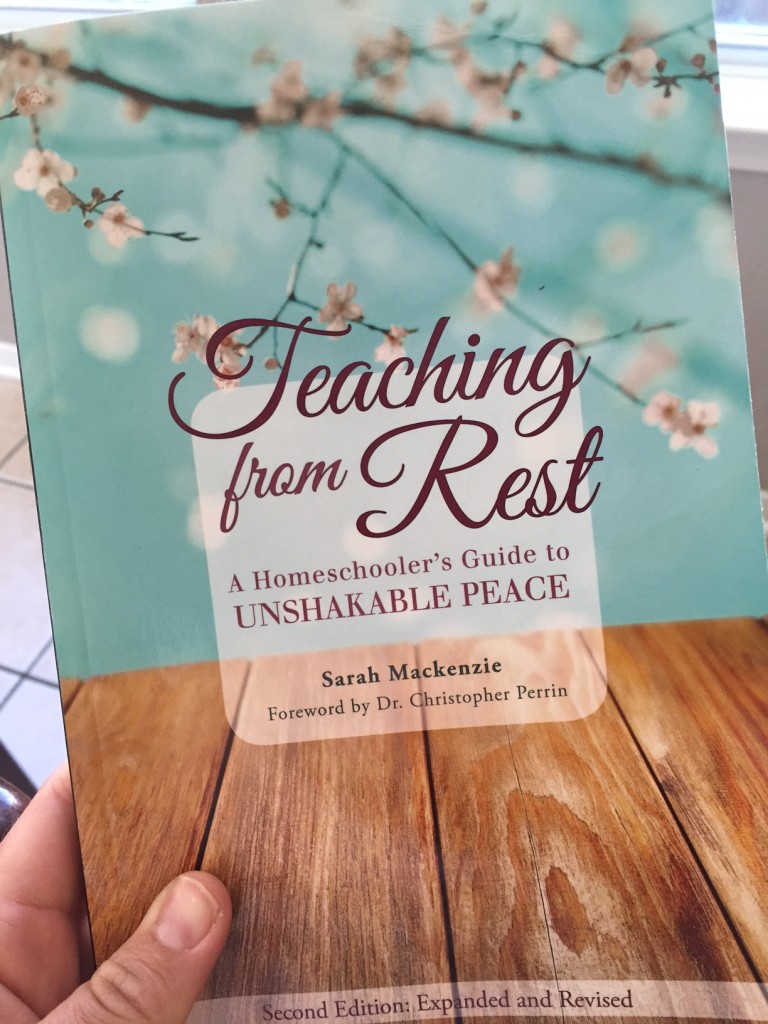A Homeschooler’s Guide to Unshakable Peace
by Sarah Mackenzie
My Takeaways
This little book was recommended to me by a fellow homeschooling mom with 5 young kiddos, a new friend who I have come to admire in her presence, her preparedness, and especially the fruit of joy in her children. Thanks, Rachael! You’re an inspiration!

I started- and finished- this book on our trip, but I haven’t sat down to share the big takeaways from it! Let’s get started! Let me start with a few quotes from Sarah Mackenzie that I just LOVE.
The true aim of education is to order a child’s affections – to teach him to love what he ought and hate what he ought. Our greatest task, the, is to put living ideas in front of our children like a feast. We have been charged to cultivate the souls of our children, to nourish them in truth, goodness, and beauty, to raise them up in wisdom and eloquence. It is to those ends that we labor.
Wow… love that so much. Sometimes when the kids are not all sitting down diligently like the little studious pupils I want them to be, with pencils flying and minds working, their brows excitedly furrowed at the working out of their own thoughts, I hear a little voice that reminds me that maybe today’s goals are less studious and more relational, less book-heavy, more sibling honor rich. To order their affections is a great benefit to living with and being with them all of the day, every day. It sure takes tons of forethought and effort though.
We have this desire to give our kids what we call an academically “rigorous” education. Andew Kern and Christopher Perrin both taught me a bit about that. In my conversations with them… I asked them how we could pursue a rigorous education while retaining a sense of rest. What I didn’t realize at the time was that the word “rigor” comes from the Latin rigor, rigoris, which means “numbness, stiffness, hardness, firmness, roughness, rudeness.” Rigor mortis literally means the “stiffness of death,” which I think we can all agree is not the goal of homeschooling our children!
Don’t aim for a rigorous education, Kern and Perrin both told me. If we are aiming to order our children’s affections, learn to love what is lovely, join in the great conversation, and cultivate a soul so that the person is ready in every sense of the word to take on the challenges around the corner and on the other side of the college entrance exams; work toward “diligence” instead.
“Diligence” comes from the Latin diligere, which means to “single out, value highly, esteem, prize, love; aspire to, take delight in, appreciate.” What we are really aiming for in giving our children a rigorous education is not just doing hard things, but cultivating a habit of focused attention. The word “student” comes from the Latin studium, meaning “zeal, affection, eagerness”. A diligent student, then, takes delight, eagerly and with great zeal, in what he loves.
The focus changes from checking everything off of the list for today to sitting with him and guiding him through his emotional responses and helping him to approach hard things with grace and peace. It is easy to go from one ditch to the other, however. You can easily say, to heck with the schedule!, and spend all day every day in pj’s and letting the kids work on minecraft (because it’s building things, right?). There is definitely a healthy balance. As my grandma would say, “we make plans so we know where we are deviating from”. Be organized, but be flexible in your planning, knowing things will change.
Curriculum isn’t something we buy. It’s something we teach. Something we embody. Something we love. It is the form and content of our children’s learning experiences…. If our books [and published resources] are beautiful, and carefully chosen, then they will assist us in teaching our children to love that which is lovely… Live your life, relish ideas, wrestle. Remember, think, and converse. That is a curriculum you cannot buy, but your child’s heart and mind will feast on it for years to come. It is full and robust, and yet at the very same time, it is simple.
I’m so glad Sarah said this. It is so difficult for my 11 year-old, who has been in private school and public school alike to see a meal, a service project, a book club, an art project as “school work”. It doesn’t fit in his mold for “education”. That is perfectly fine with me, as he will at some point. My aim is to guide and direct him to think on his own and pursue what is true, lovely, right and noble. Whatever the pathway to get there.
Leave a Reply